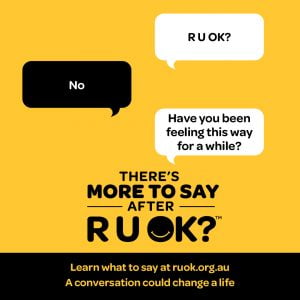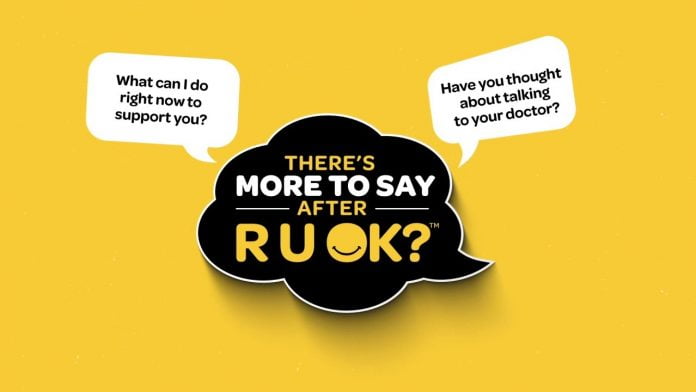Today is national R U OK? Day.
 It’s a day to take a second to remember that every person you meet, may be fighting a battle within themselves, and struggling to voice their inner thoughts and feelings.
It’s a day to take a second to remember that every person you meet, may be fighting a battle within themselves, and struggling to voice their inner thoughts and feelings.
It’s a day to remember, the power that lies behind a conversation, and behind three small words.
This year especially, has been incredibly challenging, and we’ve all been dealing with issues that we had never dealt with before, emphasising even more so, how important it is to lend an ear, and ask the question: R U OK?
The thing is, it goes beyond asking are you OK?
As the R U OK? team mentions on their website: “You don’t have to be an expert to keep the conversation going when someone says they’re not OK.
“By knowing what to say, you can help someone feel supported and access appropriate help long before they’re in crisis, which can make a really positive difference to their life.”
It can feel overwhelming when someone responds with, “No, I’m actually not OK”, so the team has compiled tips and guidelines of appropriate suggestions, on how to respond, which you can check out here at ruok.org.au/how-to-ask.
Confronting the topic of mental health is not an easy one, so R U OK? breaks the process down into four simple steps, to help:
- Ask
- Listen
- Encourage action
- Check in
Don’t forget about your workplace
This is important in workplace environments as well.
 The National Retail Association (NRA) mentions that retailer’s mental health has been at the forefront of their priorities, since the Covid-19 pandemic began, and speaks on the assistance they provide to ensure businesses have the tools to help team members.
The National Retail Association (NRA) mentions that retailer’s mental health has been at the forefront of their priorities, since the Covid-19 pandemic began, and speaks on the assistance they provide to ensure businesses have the tools to help team members.
“… from providing resources on mental health support on our Covid-19 page, to hosting webinars, to joining forces with our Workplace Wellness partner Luemo.
“However, in your own workplace it can be hard to start a conversation if you see someone who may need your support.”
The message continues by saying: “… take the time to have a look at the free resources available to help everyone at work feel safe, supported and encouraged.”
If you are seeking immediate support, please contact:
Lifeline at 13 11 14
Beyond Blue 1300 22 4636
Suicide Call Back Service 1300 659 467
Click here, for more helpful contacts.







